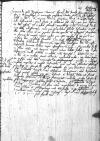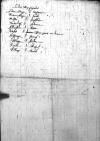Letter #6374
Ioannes DANTISCUS to Nicolaus, an archpriest and parish priest in Elbing (Elbląg)Heilsberg (Lidzbark), 1545-07-03
Manuscript sources:
| ||||
Text & apparatus & commentary Plain text Text & commentary Text & apparatus
Salutem in Domino.
Quoniam nos Divina Scriptura docuit et ecclesiae consuetudo confirmavit, quod cf. Vulg. Mc 2:13:1 sancta ergo et salubris cogitatio pro defunctis exorare ut a peccato solverentur ⌊sancta et salutaris sit oratio, quae pro defunctis Domino offertur, ut a peccatis solvanturcf. Vulg. Mc 2:13:1 sancta ergo et salubris cogitatio pro defunctis exorare ut a peccato solverentur ⌋ propitiumque iudicem inveniant, debemus autem(?) indifferenter orare pro spiritibus fidelium defunctorum, ut sit illis salus aeterna et ac perpetua sanitas, gaudium et refrigerium sempiternum. Imprimis tamen maxime rogare oportet pro iis regibus et iis, qui in eminentiore loco constituti fuerunt.
Cum itaque serenissima superinscribed in place of crossed-out illustrissima⌈illustrissima serenissima serenissima superinscribed in place of crossed-out illustrissima⌉ princeps
Volumus autem hanc nostram requisitionem de vicino ad vicinum plebanum cum subscriptionis nota transmitti et per postremo in the other hand, superinscribed in place of crossed-out postremum⌈postremum postremo postremo in the other hand, superinscribed in place of crossed-out postremum⌉ ad cancellariam nostram more solito referri.
Dat(ae) or Dat(um)⌈Dat(ae)Dat(ae) or Dat(um)⌉
in arce
 AAWO, AB, D.7, f. 48v, which was a common pattern of letters to 10 archpriests.
AAWO, AB, D.7, f. 48v, which was a common pattern of letters to 10 archpriests.

